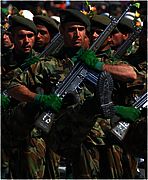Second Stage of Structural Change in Revolutionary Guards
» Basij Merged into Ground Force, Intelligence Organization Founded
While several official news agencies announced two weeks ago that the Basij force will be merged into the ground force of the Islamic Passdaran Revolutionary Guards Corps (IRGC), yesterday the Armed Forces Joint Chief of Staff confirmed the plan and announced the creation of the “IRGC Ground Resistance” force.
Hassan Firouzabadi said, “after two years of study we concluded to change the IRGC’s structure, for the Basij to work in areas such as software work and the propagation of the Basiji culture in society, and to delegate the tasks, duties and mobilization of Basij units to a new called the IRGC Ground Resistance in order to increase expertise among the units.”
The remarks of the Armed Forces Joint Chief of Staff were made following an announcement by te Mehr news agency that “in continuation of structural changes in the IRGC, the Basij resistance force will soon be merged into the IRGC ground force to boost coordination.”
This news agency, which is affiliated with the Islamic Propaganda Organization, also reported, “Following the appointment of Major General Mohammad Ali Jafari to head the IRGC, we witnessed major changes in the IRGCs structure, the new stage of which is set to begin soon.”
Following the appointment of Mohammad Ali Jafari to replace Yahya Rahim Safavi as the IRGC chief, structural changes were implemented in the IRGC and were accompanied by repeated changes in leadership. In the first round, a large number of IRGC commanders were dismissed or reassigned, while new provincial IRGC units were established and the Basij resistance force was placed under the complete control of the IRGC.
During that round, the various IRGC units were first dissolved and reassigned to 29 new units, one for each province, plus two additional units for the city and province of Tehran. The new units were charged with the task of confronting “foreign and domestic threats against the nation.”
The plan, according to Mohammad Ali Jafari, “divides the country into defense mosaics,” based on which “each defense mosaic will be used to confront threats in that specific area at a particular time.”
Leadership Changes and the Second Stage of Reform
While many analysts link changes in the IRGC’s structure in the past two years to the recent presidential election and the institution’s role in suppressing popular protests, recent changes and reassignments in IRGC’s leadership confirms that link, particularly in light of the background of some commanders and their involvement in recent events.
In this connection, last Sunday Ayatollah Khamenei appointed Mohammad Reza Naghdi to head the Basij. Naghdi is a notoriously brutal military commander and the former head of Iranian police’s counter-intelligence unit with a controversial background in torturing prisoners.
Ayatollah Khamenei also praised Hojjatoleslam Taeb, the former Basij chief who played an instrumental role in suppressing protesters, for his “dedicated efforts.”
IRGC’s Intelligence Organization
Simultaneous with recent developments in the IRGC, the state-run ILNA news agency and the Alef news website (managed by Ahmad Tavakkoli) reported last Monday and Tuesday that the IRGC’s intelligence division will be transformed into the “Intelligence Organization.”
In its detailed report on this transformation, ILNA claimed that Hossein Taeb had been chosen to head the IRGC’s Intelligence Organization because of his background, adding, “in light of the enemy’s focus on soft warfare and the necessity of strengthening the security-intelligence apparatus to confront it, it can be discerned that the promotion of the IRGC’s intelligence division to an Intelligence Organization led by Taeb, who is familiar with various kinds of intelligence and soft warfare…will bestow new responsibilities on the new organization.”
Hossein Taeb served as the ministry of intelligence’s counter-intelligence director under Ali Fallahian. He joined the IRGC after being dismissed from the ministry and played a prominent role in suppressing popular protests in opposition to election results and the arrest of reformist leaders.


